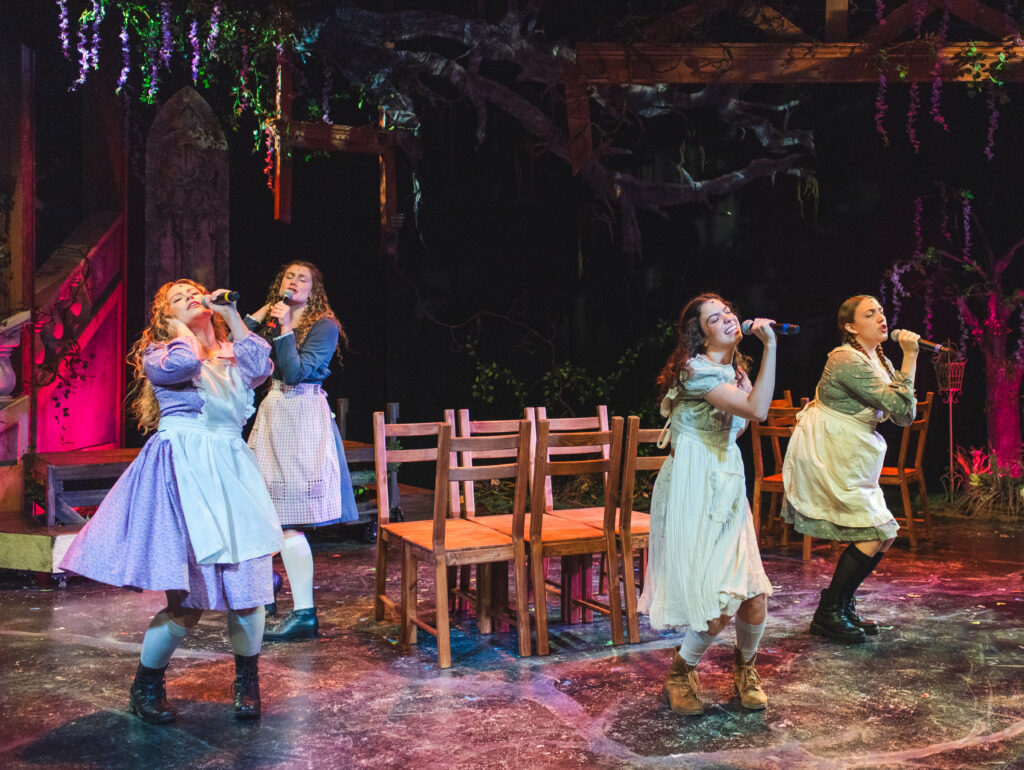There is no doubt that they are going to wound you; they are going to be your bruise. Viscerally evocative and emotionally stunning, Maryland Theatre Collective closes out their season with Spring Awakening, a musical by Duncan Sheik with Book & Lyrics by Steven Sater based on the play by Frank Wedekind. Directed & Choreographed by Tommy Malek with Musical Direction by Rachel Sandler, this gloriously impactful musical is a gut-punch for the ages with a stellar cast, stunning set, and superb overall production quality.
The scenic work inside of Studio 194’s black box play space is transformative. Set Designer James V. Raymond transports you beyond the four walls of the challenging black-box stage and into this fantasy realm of dark academia with flavors of gothic influence and hints of vernal bloom scattered subtly throughout the scenery. The live orchestra pit is cleverly masked, though only partially so, up a series of stone stairs that looks like it could lead to a cathedral choir loft. Everything from the stone structures to the painted bursts of lightning-vine on the floor (which could be veins with blood, the overall emotional current of the show; even the floor has versatile depth to be pondered when looking at it) to the way the blossoms of spring creep into the background structures is both striking and evocative, setting a tone from the moment you step into the space. It’s eerie, unsettling and haunting but in a tragically beautiful fashion. It is one of the more— if not the most— breathtaking set to come out of MTC’s recent productions and on the whole suspends the disbelief of the audience so readily you feel like you’re about to be fully immersed into a world that exists outside of time and space and yet is so thoroughly, historically steeped that you could never truly be close enough to touch it, only watch it.
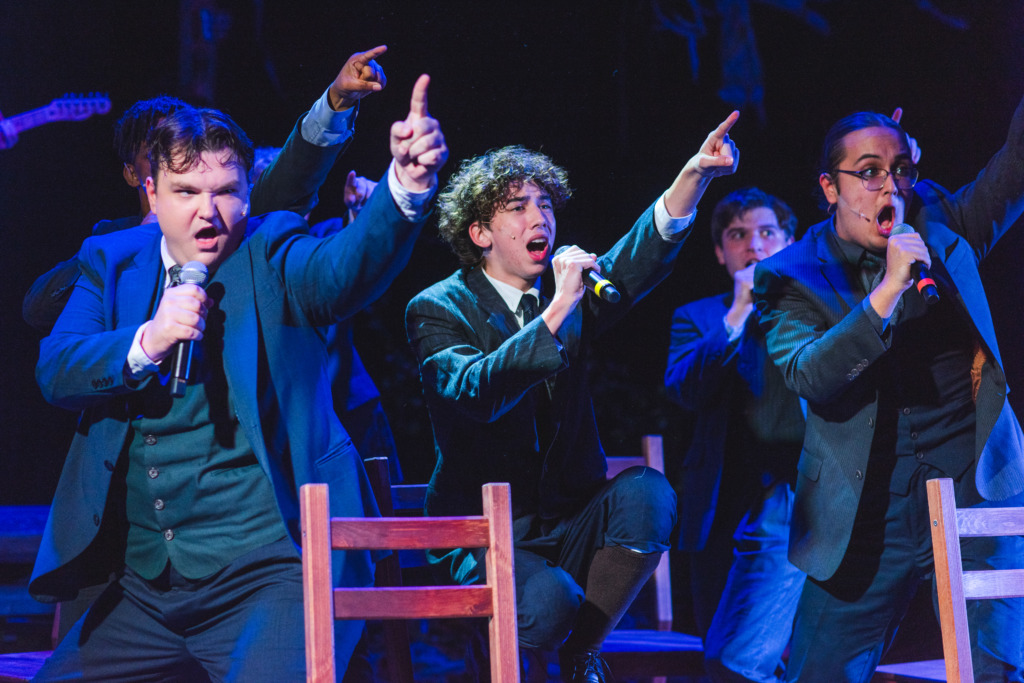
This notion of ‘theatre in your face’ but without obliterating the fourth wall is a fascinating construct that Director and Choreographer Tommy Malek has flirted with in prior productions that he’s staged within the confines of Studio 194. His approach to blocking and choreographing Spring Awakening can be likened to a 3D-cinematic experience. You’re watching this show, fully enrapt and completely absorbed— especially if you occupy a seat in the front embankment— and the actors are flying all but inches into your face without ever breaking out of their world. It’s intense and emotionally amplifying. There are multiple moments throughout the performance where certain lines are delivered or sung right at you, with a performer mere feet back staring into your soul and it’s unsettling in the way that only live, intimate theatre can be. Malek’s choreography is high-octane intensity whenever the cast of 13 are in motion. Working a proper balancing act between rhythmic execution, which includes the chairs as a part of their dancing, and free-style emotional catharsis of the body, Malek drives home the overall pathos of the show in his dance work and really amps up the intensity and frenetic edginess of the production with these moments of choreography. Keep your eyes on Tyler M. White, who plays Otto, as he is most frequently executing floor-acrobatography (think flips and cartwheels but also executed from time to time on the floor rather than from standing) and is sliding across great swathes of that play space with such intensity that you half expect him to take out part of the front row when he does.
Malek’s execution of the show is extraordinary. The libretto and music speak for themselves— no need to modernize it, shift it to America, or be unhinged with layered innovations— Malek just focuses on the emotional journey and the experience is a rewarding, albeit emotionally exhausting, one. I’ve personally covered productions of Spring Awakening over the years— equity houses, community and collegiate, a touring company— and cannot recall a time where so many of the numbers left me so gutted that I was shaking in my seat crying heavy tears. Malek’s production brings that visceral, emotional response because the actors— in addition to their vocal talents— are so intently focused on the emotional path of this story and serving it with such unadulterated realness right to your face. There should also be a note (and praises galore) for Sound Consultant William D’Eugenio and Sound Designer Zach Sexton for the way the switch between body mics and handheld mics is made, practically perfectly, throughout the performance. Malek’s use of cleverly concealed ‘concert mics’ is an excellent way to pay homage to the ‘concert nature’ of this show and both D’Eugenio and Sexton ensure that the sound quality for this dual-usage mic-setup is flawless- a true rarity in theatre as of late.
Musically the show is superb. Both from Musical Director Rachel Sandler’s work with the 13-person cast— perfect harmonies, extraordinary blends, exquisite balance of emotions in exactly the right moments of song— and from the live orchestra which is received at such a professional caliber it’s mind-blowing. Led by Keyboardist and Conductor Dave Foley, the orchestra (featuring Jefferson Hirshman on guitar, Nate Royer on drums/percussion/bass, Bailey Dicus on cello/bass, and Keith Colon on violin) creates a stunning soundtrack for the performers, enhancing the overall theatrical experience tenfold. Watching Keith Colon, who appears on the steps that ascend to the pit when the show gets underway (as Wendla is singing her solo introduction, “Mama Who Bore Me”) is one of multiple breathtaking moments; signifying that music is as much a part of their world as the stories that bind them to this reality. The concept is genius and my only complaint is that it could have been utilized more fully throughout the performance (there are moments when other performers— like Maxwell Wolf, playing Hanschen— appears with an electric guitar, to theatrical effect only, and you ‘see’ this meandering instrumentation again, but having an actual live player backing the songs in that visible way was truly remarkable.)
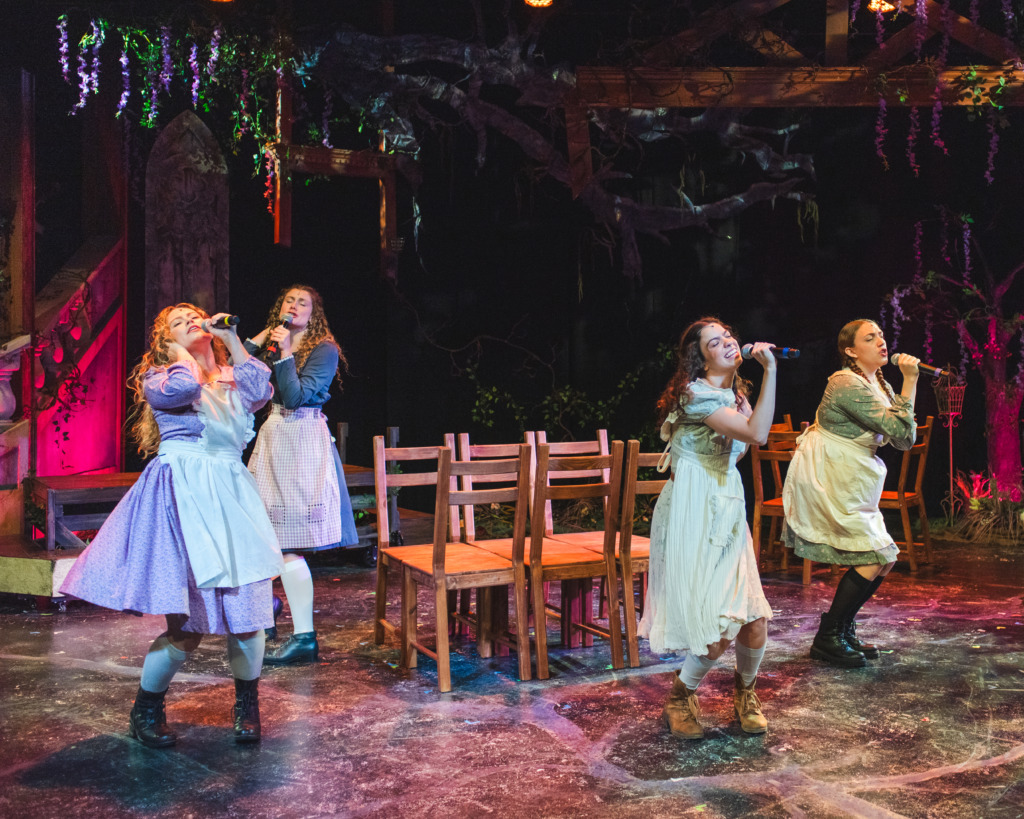
The other thing that stands out in a truly impressive fashion comes from Director Tommy Malek’s understanding of the source material. There’s no denying that Spring Awakening is dark. And although the scene at the end of the first act is handled tastefully rather than with a raw smack of intensity and the end of Mortiz’ duet “Don’t Do Sadness/Blue Wind (Reprise)” is handled with a physical blackout and lack of sound, the intentions in both of these moments are crystal clear— Malek finds a way to keep the audience from fully drowning in the abyss of sorrows that comes with this show. There are moments— aptly placed, meticulously selected, and exactingly executed— of comedic levity which creates a life-raft for the audience, gives them permission to remember the feeling of joy, silliness, and humor, and balances out this otherwise eviscerating emotional experience. One such comes to mind during “The Word of Your Body (Reprise 2)” featuring Hanschen and Ernst; I won’t spoil the humor but it punches you in the funny bone with the same intensity as any number of the heavier moments punch you with gravitas and darkness. Malek lets quite a few of these humor-laced moments fall on the shoulders of Adult Man and Adult Woman (Jim Adams and Alissa Margolis, respectively), like when they’re over-pronouncing each other’s names at the academia setting or stealing those ‘cheat-out’ glances to the audience when they finish an inappropriate conversation.
Aesthetically speaking— though we’ve already shared so many praises of the show’s set design— we can’t forget the costume work, which also falls on Malek’s shoulders (assisted by Ari Mitchell) and the production’s illuminating practices, by way of Lighting Designer Thomas P. Gardner. Malek and Mitchell’s sartorial selections for the show ground the production’s setting in that ambiguous yesteryore time frame and locale whilst acknowledging the fantastical feel of ‘dark academia’ and gothic romance. Gardner does a stupendous job of utilizing light, both warmth and coolness as well as brightness and darkness to augment particularly intense moments all throughout the performance. One of my personal favorites is the volcanic-explosion of disco rainbow party lights for “Totally Fucked.” Opting for more full lights during “The Dark I Know Well” is certainly a choice and a bold one at that, which forces the audience to take a more dynamic look at what’s being discussed in that moment. And while it’s so much more than aesthetics on Intimacy Director Shawna Potter’s part, there are praises to be lauded for her work as well, not only because of how the scene leading out of the first act is handled, but because of the overall intimate nature of how so many of these characters interact with one another; it is a beautiful and palpable achievement, the work that Potter has put into this production.
While they take on multiple roles, all named in one regard or another, they are credited simply as Adult Male (Jim Adams) and Adult Female (Alissa Margolis) and both are impressive components of this performance. There are subtleties to the way they approach their varying characters and yet similarities too, which lends itself to the notion that in the world and viewpoint of these angst-fueled teenagers, ‘all adults are the same’; Adams and Margolis do remarkable work in their respective roles, much of which adds the desperate necessity of levity and humor to this story. Adams should be noted for one moment in particular during “Left Behind”, as it is truly an ugly-cry moment that hits low and hard in the emotions.
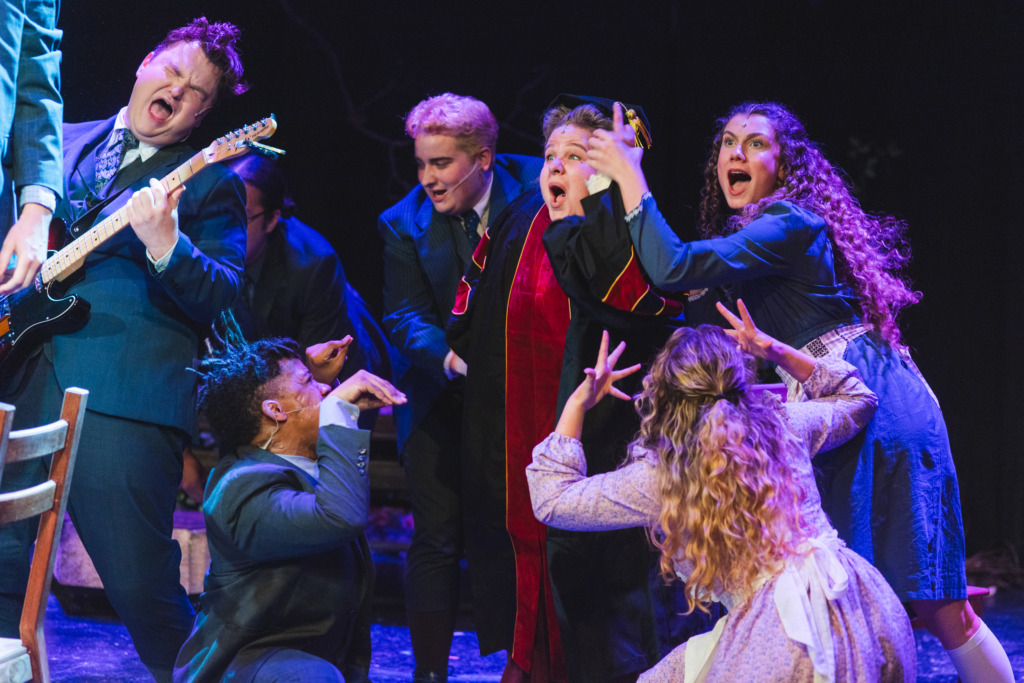
With a named ensemble of 11— Geneva Croteau as Anna, Taylor Litofsky as Thea, Cera Baker as Martha, Frankie Marsh as Isle, Sophie Snyder as Wendla, Tyler M. White as Otto, Atticus Cooper Boidy as Ernst, Lucas White as Georg, Maxwell Wolf as Hanschen, Max Ryon as Moritz, and Andrew Limansky as Melchior— you’re in for a true theatrical treat. When this bunch comes together for numbers like “My Junk”, “The Song of Purple Summer”, and “Totally Fucked” you get this sense of intrinsic oneness, that they are of one spirit, one emotional experience and one voice, in addition to being their own unique character with their own individual story, and their own personal sound. It’s wild and a shining rarity, especially in musical theatre. You get vocal sensationalism from all eleven of these performers and it’s life-changing to hear them sing together, storytell together, exist as one and many at the same time together.
The heaviness that both Cera Baker as Martha and Frankie Marsh as Isle bring to “The Dark I Know Well” is discomforting and unsettling on a deeply felt level, particularly with the haunted looks in each of their eyes. Every single performer in this production showcases their vocal versatility, capability, and ultimately their talent; Duncan Sheik and Steven Sater just present some characters with more opportunities than others to really shine in this musical. You get a similar showcase, though in a very different emotional vein, from Maxwell Wolf as Hanschen and Atticus Cooper Boidy as Ernst, in “The Word of Your Body (Reprise 2)” as well as from Tyler M. White as Otto and Lucas White as Georg in “The Word of Your Body (Reprise 1)” with both duets teaming with pathos from all four performers. That aforementioned foursome teams up with the Melchior and Moritz character for “All That’s Known” and “The Bitch of Living” with striking fervor to create two very different musical, emotionally-charged intensities in those numbers. The same can be said for Geneva Croteau as Anna, and Taylor Litofsky as Thea when they join the girls for “My Junk.”
The character of Ilse (Frankie Marsh) drifts in and out of the background early on, until she’s featured in “The Dark I Know Well” but once you meet her character at the top of Act II when she comes crashing into Moritz, you feel this bohemian rapture all about her; a true physical and emotional embodiment of a ‘free spirit.’ And vocally she’s matched for that notion, particularly when she sings “Blue Wind” and again when that number blends into a combination-reprise of “Don’t Do Sadness/Blue Wind.” There is something feral in her eyes, body language and her voice when she starts describing the unfettered freedom of her lifestyle; watching her in those brief moments is fascinating beyond compare.
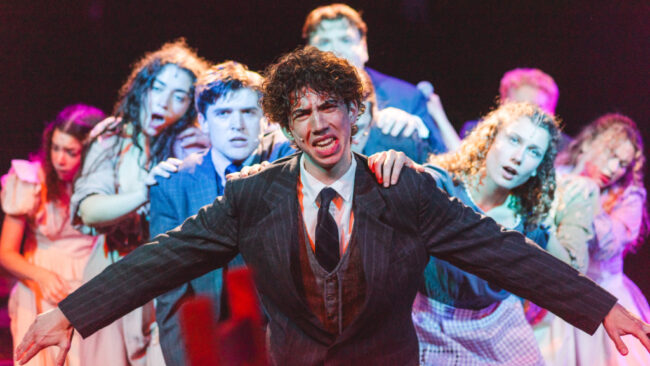
In watching Max Ryon step onto the stage as the highly-strung, extremely neurotic-bordering-on-spastic, unhinged with anxiety character of Moritz, I was deeply concerned as he appeared to start the character with a level-ten energy and expression. If one starts at such a heightened peak of existence, it does beg question— especially as Ryon maintained that heightened expressionism right from jump-street— as to whether or not there were would be anywhere for him to go to once the real magnitude and gravity of his character’s situation hit in later scenes. (This might have gone unnoticed or undetected if one had never seen the show before.) But Ryon did not disappoint. In addition to maintaining that manic-level of over-reactive anxiety, depression, self-destruction, he found a higher, more intense way to express those even darker moments as they fell upon his character, which ultimately made “Don’t Do Sadness”, the moments after its completion, and the whole of “Left Behind” such an agonizingly brutal evisceration of the soul that I was moved to intense tears. (And I do not cry easily at the theatre.) Vocally he’s astonishing, emotionally he’s hypnotic, and the all-around intensity which he brings to the stage is its own fuel-source for this high-octane, emotionally-explosive show.
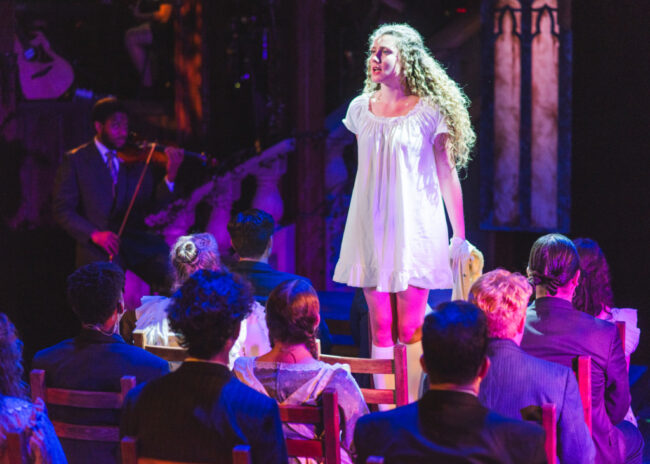
With the innocence of naiveté playing at her forefront, Sophie Snyder’s Wendla is in perfect equilibrium with her burning curiosity. With a powerhouse voice to kickstart the acoustic “Mama Who Bore Me” (featuring Keith Colon on stage with his violin to start her off) you can tell from the very first note she hits that she’s going to be a sensation. The comic antics exchanged with her mother (Alissa Margolis) and the nervous flirtations with Melchior (Andrew Limansky) are exceptionally curated and delivered flawlessly within the confines of the character. There is a frightened tenderness that creeps into her voice for “The Word of Your Body”, her first duet with Melchior, and a harrowing sense of ‘knowing’ once she takes up her voice in “The Guilty Ones.” Snyder haunts her way through “Those You’ve Known” the trio featuring Ryon’s Moritz and Limansky’s Melchior. The way her voice pleads with hope, Ryon’s voice pleads with sorrow and Limansky’s voice finds the middling ground between the two is truly sublime.
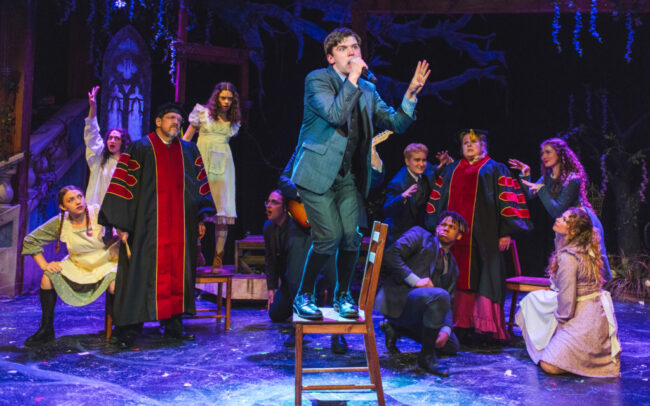
As for the rogue renegade, Melchior Gabor, Andrew Limansky has this role perfectly in hand. With a burning restlessness that supercharges every action, from the casual conversations he has with his diary to the more intense moments spent interacting with Wendla, you get the sense that Limansky is Melchior Gabor rather than just channeling the idea of him or trying to be him. It’s impressive. And his vocals are a powerhouse, sensational force of their own to be reckoned with. “Totally Fucked” my be a group number but he blazes a trail through that number like he’s intent on burning Studio 194 to the ground with his voice alone. And that soul-piercing gaze that he casts out into the audience doesn’t hurt either. Versatile and evocative, switching up from numbers like that to “And Mirror-Blue Night”, you get a truly well-rounded and utterly exquisite performance from Andrew Lemansky in this role.
Don’t find yourself totally f**ked…which you might, if you wait too long to get tickets to this show.
Running Time: 2 hours and 15 minutes with one intermission
Spring Awakening plays through July 28th 2024 with Maryland Theatre Collective in Studio194 of The Chesapeake Arts Center— 194 Hammonds Lane in Brooklyn Park— Baltimore, MD. Tickets can be purchased at the door, though they are strongly recommended to be booked in advance online.

